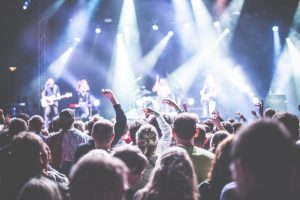Concerts are one of the most common causes of tinnitus in Texas and throughout the country. Don’t let this once-in-a-lifetime event be responsible for something that will be with you forever – tinnitus.
What is Noise-Induced Hearing Loss?

Sounds are measured in decibels; anything over 85 dB can cause damage to the intricate workings of your ear. To give you some sort of perspective:
- A normal conversation measures around 60 dB.
- Heavy Katy traffic measures around 85 dB and can cause damage within 8 hours.
- A lawnmower measures around 100 dB and can cause damage within 15 minutes.
- A rock concert can clock in at around 120 dB and can cause damage instantly.
Just like noise-induced hearing loss, tinnitus is caused by damage to the ear. Within the inner ear, there are small hairs. When a soundwave enters the ear it causes the hair to move; this movement sends an electrical signal through the auditory nerve to the brain where it is interpreted as sound. If these hairs become damaged, they can begin to randomly send signals to the brain. This causes tinnitus.
Age-related hearing loss, exposure to loud noise and earwax blockage are all common conditions that cause inner ear damage.
Can You Prevent Tinnitus?
While you understand all the risks involved, you probably still want to go to that concert you spent your hard earned money on. The good news is there is a fairly simple solution to this quandary – earplugs.
If you are in a pinch, disposable, one-size-fits-all earplugs are sold at most pharmacies. But the best results are from the ones that are custom-fit to your ears by your Katy audiologist.
There are a number of earplugs on the market; the ones you want to protect your ears with while rocking out are called musician’s earplugs. These custom earmolds are able to reduce sound levels evenly so music and speech sound clear. These plugs prevent dangerously loud sounds from entering the ears but still keep the integrity of the music intact.
Don’t let the concert of a lifetime leave you with a lifelong condition. Call Today’s Hearing at (281) 578-7500 for more information on how to safely attend a concert.